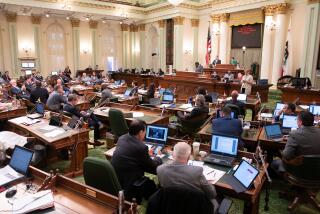Bill to Ease U.S. Ban on Workers in Politics Passes
- Share via
WASHINGTON — Relaxing a law that has been in effect for more than 50 years, the House Tuesday gave final congressional approval to a bill that would allow most federal employees to take part in partisan politics on their own time. The vote was 339 to 85.
With some exceptions, federal employees would be permitted to hold office in a political party, be a delegate to a party nominating convention or take an active role in running a political campaign.
Even under the revisions to the 1939 Hatch Act, however, federal employees would not be permitted to run for office in partisan elections or raise political funds from the general public. Politics on the job--such as wearing a political button--would also be barred.
In addition, about 85,000 employees of “sensitive” agencies such as the FBI, Secret Service, Central Intelligence Agency and criminal investigation units still would be barred from active political roles.
The measure was sent to President Clinton, who has promised to sign it, climaxing a 20-year campaign by advocates who said it would end “second-class citizenship” for almost all of the 3 million persons who work for the U.S. government. Federal employee unions strongly backed the bill.
Some Republicans, however, argued that it would “politicize” the federal work force, the same argument used by President George Bush in 1990 when he vetoed a similar bill approved by the Democratic-controlled Congress.
But the bill this year was supported by a broad bipartisan alliance of 248 Democrats, 90 Republicans and one independent, while 84 Republicans and a solitary Democrat voted against it. The same measure passed the Senate earlier this year on a 68-31 vote.
“We must unlock the yoke that has been put around the neck of civil servants,” contended Rep. Leslie L. Byrne (D-Va.), whose Northern Virginia district includes thousands of federal employees.
But Rep. Frank R. Wolf (R-Va.), who represents a similar district, countered: “This bill will politicize the federal work force.” Wolf argued that pressure would be applied to U.S. employees to give active support to a political party in order to keep their jobs.
Proponents said the legislation contained strong penalties for political intimidation or coercion and barred the use of political endorsements in hiring and promoting civil servants.
The original Hatch Act was passed following revelations that federal workers were coerced into contributing to a senator’s campaign fund. It became law at a time when less than one-third of a much smaller federal work force was covered by merit system protections, compared to 79% who are now covered by civil service rules.
More to Read
Get the L.A. Times Politics newsletter
Deeply reported insights into legislation, politics and policy from Sacramento, Washington and beyond. In your inbox twice per week.
You may occasionally receive promotional content from the Los Angeles Times.









